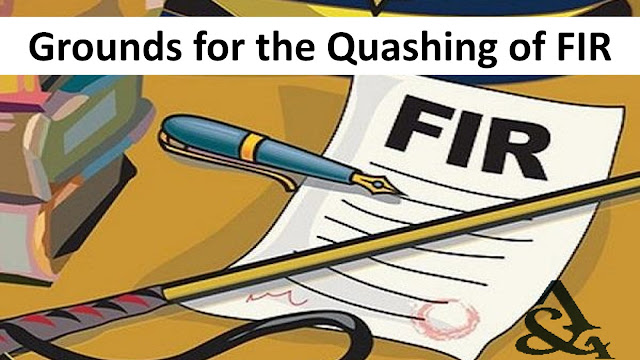Grounds for Quashment of FIR
Dear Readers: In this Article you will learn about the grounds for quashing an FIR (First Information Report) and the process involved. Understand the various reasons for quashing an FIR, including lack of jurisdiction, legal defects, false allegations, abuse of process, settlement between parties, and violation of fundamental rights. Get answers to frequently asked questions about the quashing of FIRs, such as the procedure, court authority, timing, and consent requirements. Explore the possibilities of quashing an FIR even in cases of serious offenses or after the accused has been arrested.
The term "quashing" of an FIR" typically refers to the legal process of canceling or setting aside a First Information Report (FIR). An FIR is a written document that is prepared by law enforcement authorities when they receive information about the commission of a cognizable offense.
The grounds for quashing an FIR may vary depending on the jurisdiction and applicable laws. However, some common grounds on which an FIR may be quashed include:
• Lack of jurisdiction:
If the police or law enforcement agency that filed the FIR does not have the authority or jurisdiction to investigate the alleged offense, the court may quash the FIR.
• Legal defect:
If the FIR suffers from legal defects, such as being vague, unclear, or lacking essential details, the court may quash it. The FIR should provide sufficient information about the offense to enable the accused to prepare a defense.
• False or frivolous allegations:
If it can be demonstrated that the FIR is based on false or frivolous allegations, the court may quash it. This typically requires presenting strong evidence or arguments to prove that the allegations are baseless.
• Abuse of process of law:
If it can be shown that the FIR was filed with malicious intent or to harass the accused rather than for genuine reasons, the court may quash it.
• Settlement between the parties:
In certain cases, if the parties involved in the dispute have reached a settlement and mutually decide to withdraw the allegations, the court may quash the FIR. However, this generally requires the court's approval and consideration of the nature of the offense.
• Violation of fundamental rights:
If the FIR is found to violate the fundamental rights of the accused, such as the right to liberty, privacy, or fair trial, the court may quash it.
It's important to note that the decision to quash an FIR lies with the judiciary. The court will consider the specific circumstances of each case and the applicable laws before determining whether the grounds for quashing the FIR are valid.
FAQs about Quashing of FIR Here are some frequently asked questions about the quashing of FIRs
Q• What is the procedure for quashing an FIR?
The procedure for quashing an FIR may vary depending on the jurisdiction. Generally, an application or petition needs to be filed before the appropriate court, requesting the quashing of the FIR. The court will then examine the grounds mentioned in the application and hear arguments from both parties before making a decision.
Q• Which court has the authority to quash an FIR?
The power to quash an FIR usually lies with the High Court or the Sessions Court, depending on the jurisdiction and the seriousness of the offense. In some cases, the Supreme Court of the country may also have the authority to quash an FIR.
Q• Can an FIR be quashed at the police station level?
No, the police station or the investigating agency does not have the authority to quash an FIR. Only the judiciary, specifically the High Court or the Sessions Court, can quash an FIR.
Q• Can an FIR be quashed if charges have already been framed by the court?
Generally, after charges have been framed by the court, the process of quashing an FIR becomes more challenging. However, if new evidence or circumstances come to light, the court may still consider quashing the FIR.
Q• Can a person file for the quashing of an FIR before the charge sheet is filed?
Yes, it is possible to file for the quashing of an FIR before the charge sheet is filed. If the grounds for quashing the FIR are strong and the court is convinced, it may quash the FIR even before the completion of the investigation.
Q• Is it necessary to have the consent of the complainant for quashing an FIR?
No, it is not mandatory to have the consent of the complainant for quashing an FIR. The court will consider the merits of the case and the grounds presented by the parties involved, irrespective of the complainant's consent.
Q• Can an FIR be quashed in cases of serious offenses?
Quashing an FIR in cases of serious offenses is generally more difficult. However, if there are strong grounds or legal defects in the FIR, or if the investigation is found to be improper or malicious, the court may still consider quashing the FIR.
Q• Can an FIR be quashed if the accused is already arrested?
Yes, an FIR can be quashed even if the accused has been arrested. The arrest itself does not prevent the court from considering a request for quashing the FIR.


Ma Sha Allah
ReplyDeleteMa Sha Allah
ReplyDelete